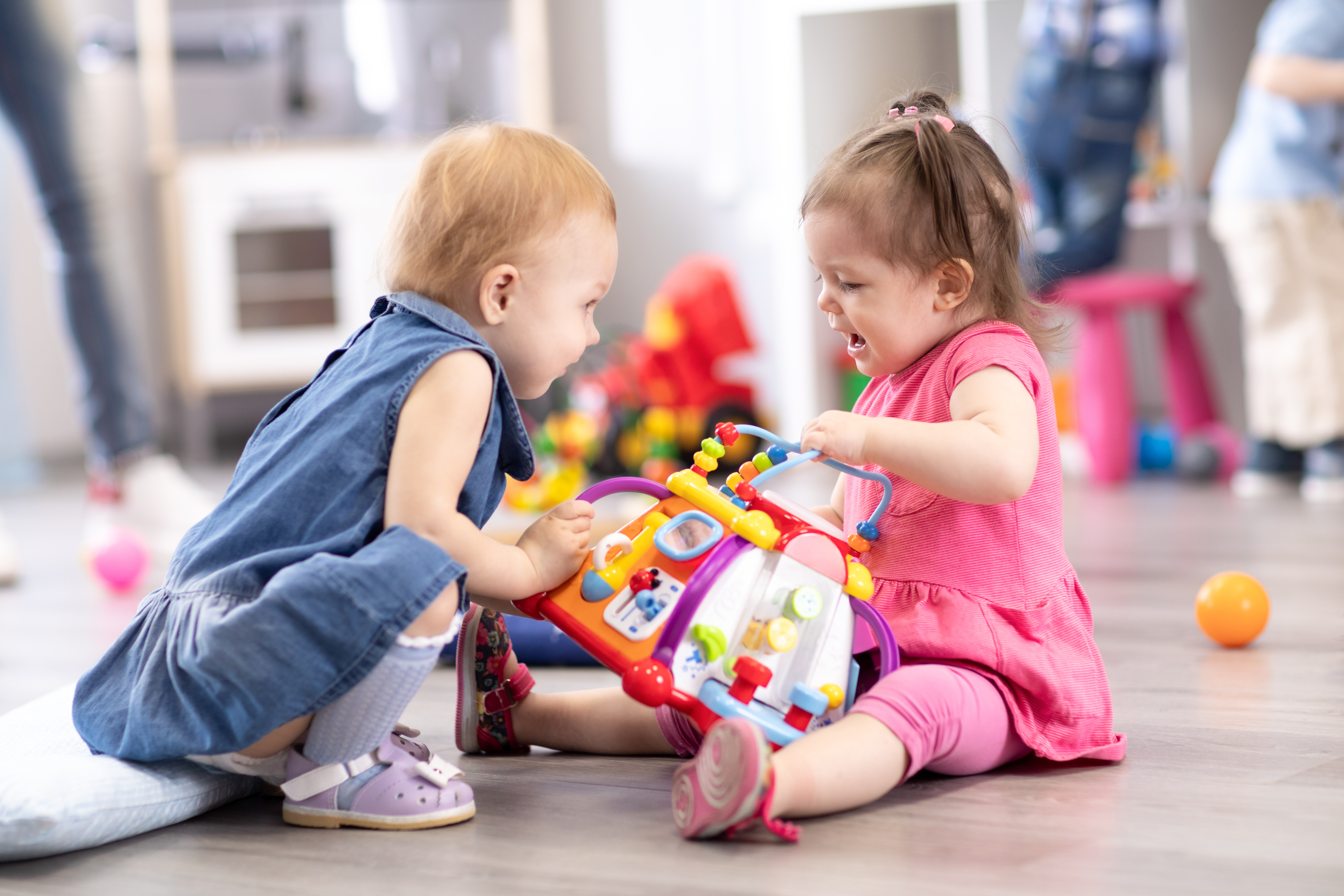
And if we're honest, there's another reason we get annoyed when kids fight over toys. When our children seem to be failing at generosity, we feel like we're failing at our job of civilizing those grabby childish instincts into a good person.
So in most families, the unwritten policy is that children are expected to share, or at least take turns, with most toys. The parent decides when one child has had a toy long enough, usually based on how loud the protest is from the sibling or friend. While that seems expedient, it reinforces competition between siblings, dis-empowers both children, and teaches children that if they fuss, they get their way. And it certainly isn't pleasant for the parent to constantly have to step in.
You'll be relieved to learn that there are other ways to handle the whole concept of sharing, that teach more constructive lessons, and that get you out of the role of judge, jury and police officer.
Let’s start with the premise that we want our children to grow into generous people who are able to notice and respond to the needs of others. Of course, we also want our children to be able to meet their own needs, which include pursuing their own work and play, because that’s how they develop mastery.
There’s an obvious tension here that parents need to acknowledge. We don’t want our kids to feel they should interrupt what they’re working on to “give” something to another child just because the other child asks. On the other hand, we do want our child to notice when another child would like a turn, and to ensure that child gets a turn. And when someone else has something that our child wants, we hope that she’ll be able to control her impulses so she doesn’t grab it, but instead will use her words to work out an arrangement so that she can use the object in the future.
In other words, we want our child to advocate for her own needs, to respect the needs of others, and to be able to delay gratification to wait for what she wants. Right?
All of which means we need to re-think how children “learn to share” and what they learn when we force them to share.
Nancy Eisenberg, a leading researcher on children’s social development, says that children become more generous by having the experience of giving to others and learning how good that feels.[i] There is a catch, though, says Eisenberg. The experience must be voluntarily chosen by the child. If we force children to share, they walk away resentful, not feeling generous. Not surprisingly, they’re less likely to share after that.
So what if we simply let the child who has the toy decide how long she needs it, and then give it to the other child when she's ready? We can call this "self-regulated turns," or in child lingo "long turns."
You can see the obvious problem with this idea. What about the poor sibling who has to wait for his turn? You can expect this child to protest loudly, which is inconvenient for you and miserable for him. And beyond that, it hardly seems fair that one child has to wait while the other uses the coveted toy for as long as she pleases—does it?
But maybe we're actually teaching better lessons, that will help kids learn to share more readily, and to work out disputes more independently. Let’s consider the sibling who’s desperately unhappy waiting for his turn for what may feel like forever. We have two options.
Option #1- We tell the first child he’s had the toy long enough, take the toy away, and give it to the sibling. The second child learns:
- If I cry loud enough, I get what I want, even if someone else has it.
- Parents are in charge of who gets what when, and it’s arbitrary, depending on their whim and how dramatically I beg for my turn.
- My sibling and I are in constant competition to get what we need. I don’t like him.
- I guess I’m a greedy person, but that’s what I need to be in order to get what I deserve.
- I had better “play fast” because I won’t have this item for long.
- I won! But soon I will lose the toy again! I had better protest loudly when my turn is up to get every minute I can. And then start protesting again as soon as it’s my sibling’s turn. If I make my parent miserable, I’ll get more time with the toy.
Notice that this child’s attention is barely on the toy he’s won. He can’t play freely. All he can do is feel the clock ticking. So the conventional approach of forced sharing undermines the ability of children to lose themselves in play, as well as undermining the sibling relationship by creating constant competition. Neither child gets to experience the generosity of having their fill and giving to the other.
Option #2 – We tell the second child that he can ask the sibling
when he will be done with his turn, and assure him that we’ll help him wait until the sibling decides she’s done with the toy. This time, the second child learns:
- I can ask for what I want. Sometimes I get a turn soon, and sometimes I have to wait.
- It’s okay to cry, but it doesn’t mean I get the toy.
- I don’t get everything I want, but I get something better. My parent always understands and helps me when I’m upset.
- After I cry, I feel better.
- I can use another toy instead and really enjoy it. I’m getting better at waiting.
- I don’t have to whine and cry to my parent to convince them to get me a turn. Everybody has to wait for their turn, but everybody gets a turn sooner or later.
- I like the feeling when my sibling gives me the toy. I like her.
- I can use a toy for as long as I want; nobody will make me give it to my sibling at a moment’s notice. When I’m done with the toy and give it to my sibling, I feel good inside—I like to give her a turn. I’m a generous person.
This child is developing impulse control and the ability to delay gratification. We’re supporting deeper play by not taking away the toy in the middle of the child’s use of it. We’re helping both kids discover their own generosity. And we’re supporting a warmer sibling relationship by reducing competition.
This can be a challenging new way of doing things, for both parents and children. But as kids learn that they’ll eventually get the toy, and that their right to a toy they’re using will also be protected, they get better at managing their impatience. In fact, every time you support a child through the wait, they build the mental muscle to delay gratification. And fairly quickly, you’ll see your children start asking each other when they can have a turn, and offering the toy to their sibling when they’re done with it.
That a child will offer her a sibling a turn, without parental enforcement, is hard to believe for most parents. But if you adopt this policy, it will become an everyday occurrence in your home. You’ll still have to buy two of the most treasured items, and you’ll still have to put the favorites away before other children visit. But rather than policing sharing, you’ll find yourself coaching your kids as they wait for their turn, and admiring how often they navigate taking turns without you running interference.
Why not try it?
WATCH VIDEO by the Atlantic Magazine featuring Dr. Laura Markham
on Helping Kids Learn To Share
[i] Eisenberg, Nancy. “Eight Tips to Developing Caring Kids” in David Streight (Ed). (2009). Good Things To Do: Expert Suggestions for Fostering Goodness in Kids Portland: The Center for Spiritual and Ethical Education.
Additional Reading:
Additional Resources
Please note: These books are Amazon links with photos of the books. If you are not seeing them on your page, it may be that your browser is not picking them up. Please try a different browser. Enjoy!






